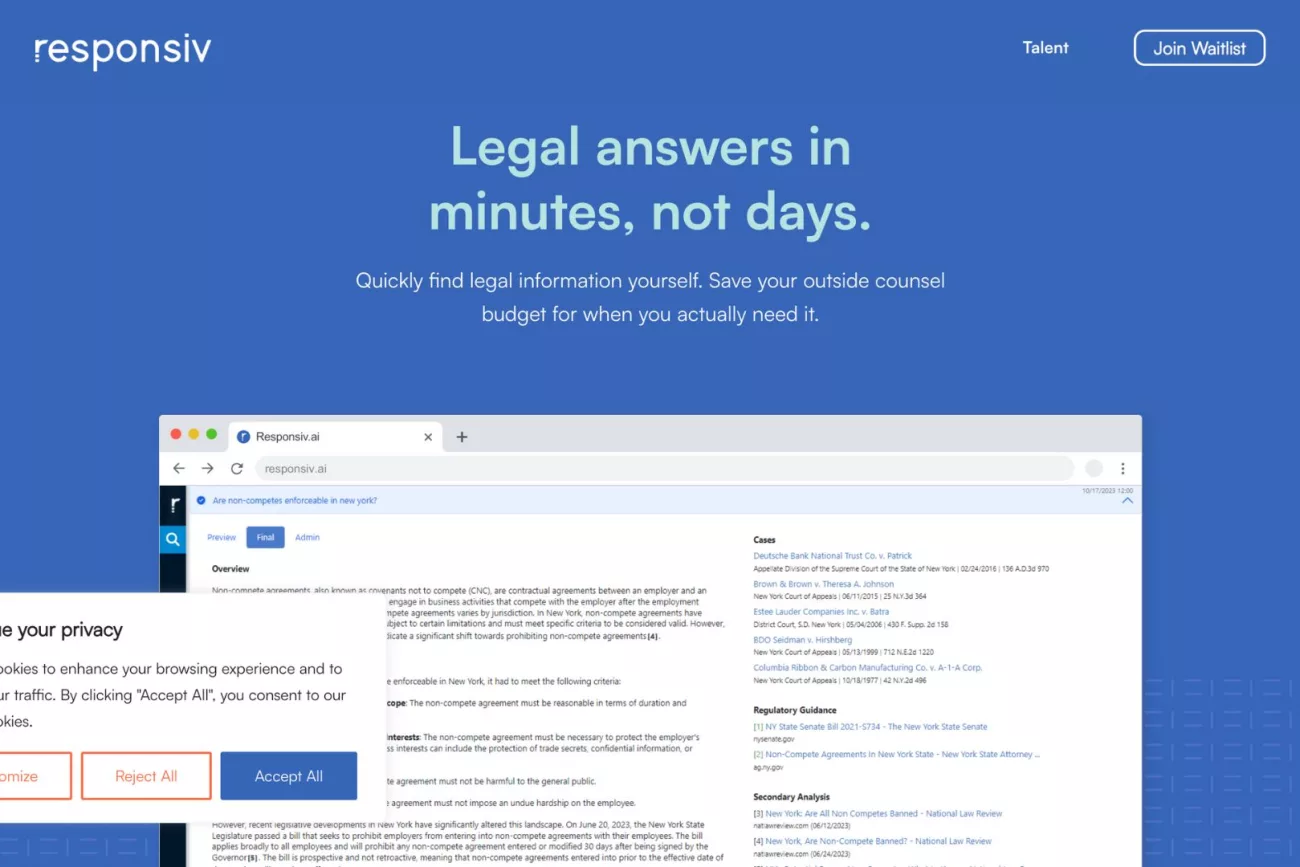
Key Points
- Legal Tech Revolution for SMBs: SMBs are increasingly adopting legal tech, particularly LLMs, to efficiently manage legal tasks.
- Challenges and Solutions: Main challenges include infrastructure needs, integration, and data privacy, with practical solutions available for each.
- Strategic Adoption Approach: SMBs should adopt legal tech strategically, focusing on specific use cases and ROI.
- Anticipating and Managing Change: Careful planning, stakeholder engagement, and training are crucial for successful legal tech integration in SMBs.
Future Law Firms Will Undergo 3 Pivotal Transformations
Discover how AI is revolutionizing the legal world. From law firm structures to educational shifts,
Can AI wake up? Signs we might miss!
Dive into the riveting debate on AI consciousness, from Google’s claims to legal dilemmas. Is
Exposed: Astonishing Renters Rights Tips to Dominate Your Tenancy!
Mike Ruggles Founder & CEO Instagram Linkedin Follow me on Instagram & LinkedIn for exclusive
Small Business, Big Law: The Bold New World of Legal Tech for SMBs
Rethinking Legal Tech: Not Just for the Big Leagues Anymore
Welcome to the dazzling, yet daunting world of legal tech, where small and medium-sized businesses (SMBs) are no longer mere spectators but key players.
Forget the old narrative that legal tech is a highbrow affair reserved for posh law firms. As the founder of an AI-driven contract management company, I’m here to tell you: the real game-changer is when legal tech tools shake hands with the day-to-day hurdles of SMBs.
Why SMBs Are the New Legal Tech Frontier:
Contracts: The Heartbeat of Business
- The SMB Contract Conundrum: For SMBs, contracts are vital yet daunting. They’re essential for defining business relationships, but without the legal resources of larger corporations, SMBs often struggle. A survey by Deloitte found that 57% of small businesses find legal costs a major barrier. This is where technology steps in.
- LLMs to the Rescue: Large Language Models (LLMs) are revolutionizing contract management for SMBs. They can draft, review, and optimize contracts, often in a fraction of the time and cost of traditional methods. For instance, an LLM can process a contract in minutes, which might otherwise take hours for a human lawyer. This isn’t just about efficiency; it’s about leveling the playing field for smaller businesses.
The Challenges: No Rose Without Thorns
- Infrastructure Dilemmas: Implementing LLMs requires a robust digital infrastructure. SMBs must decide between cloud-based solutions or building their own systems. Cloud solutions offer flexibility and lower upfront costs, but there are concerns about data security and ongoing expenses. For example, using a cloud-based LLM might cost an SMB $500 per month, while setting up an in-house system could run upwards of $20,000 initially.
- Integration and Usability Trials: Integrating LLMs into existing workflows poses its own challenges. It’s crucial to ensure that these tools are user-friendly and accessible to employees who may not have a legal background. Training becomes essential here. A survey by Gartner showed that 70% of employees had not mastered the skills they needed for their jobs, and the introduction of LLMs could add to this gap. Thus, investing in user-friendly interfaces and comprehensive training programs is vital for successful integration.
Practical Applications and Real-World Examples:
- Case Study: A Retail SMB: Consider a small online retail business. By using an LLM, they were able to reduce the time spent on contract reviews by 60%, significantly speeding up their deal closure rate.
- Statistical Insight: According to a study by McKinsey, the average professional spends 28% of their workday reading and answering email, and a significant portion of this time is contract-related. LLMs can cut down this time dramatically, freeing up resources for core business activities.
The Infrastructure and Integration Challenge:
Choosing the Right Infrastructure
- Balancing Cost and Security: SMBs must weigh the initial investment of an in-house system against the ongoing costs and potential security risks of cloud solutions. A study by IBM found that the average cost of a data breach in 2020 was $3.86 million, a critical consideration for SMBs when deciding on cloud-based LLMs.
- Case Study: A Consulting Firm: A small consulting firm opted for a hybrid model, using cloud-based LLMs for less sensitive tasks and in-house systems for high-stake contracts. This approach offered them a balance of cost-effectiveness and data security.
Seamless Integration into Existing Workflows
- User-Friendly Solutions: The key to successful integration is user-friendliness. Tools that require minimal legal or technical know-how are more readily adopted. For example, a user-friendly LLM tool helped a small marketing agency reduce the time spent on contract negotiations by 40%.
- Training and Support: Providing adequate training and support is crucial. An SMB should allocate resources for ongoing training sessions to ensure employees are comfortable and proficient in using LLMs. A survey by TechRepublic indicated that 55% of businesses cited adequate training as a critical factor in successful tech adoption.
Overcoming Obstacles: A Practical Guide
Hosting Solutions:
- Balancing Act: SMBs need to find a hosting solution that strikes the right balance between cost, functionality, and data privacy. For instance, a small law firm may opt for a hybrid cloud solution, which can offer the scalability of public clouds and the security of private clouds. According to a 2021 report by Flexera, 92% of SMBs are using a multi-cloud strategy, which underscores the importance of a balanced approach.
- Cost-Benefit Analysis: A careful analysis of the total cost of ownership (TCO) is essential. For example, cloud hosting may seem cheaper upfront but can incur higher operational costs over time. Conversely, in-house hosting demands a higher initial investment but can be more cost-effective in the long run.
Integration Strategies:
- Technology Compatibility: Ensuring that LLMs are compatible with existing technology is crucial. For a small financial advisory firm, integrating an LLM might mean upgrading their existing CRM system to ensure seamless operation.
- Employee Training and Adoption: Successful integration also hinges on employee training and adoption. A study by Prosci found that projects with effective change management were six times more likely to meet objectives than those without. This highlights the need for comprehensive training programs and change management strategies.
Data Privacy Balancing Act:
- Navigating Data Privacy: SMBs must carefully navigate the trade-offs between leveraging data for LLM efficiency and safeguarding privacy. A bakery chain, for instance, might use anonymized contract data to train its LLM while ensuring sensitive customer information remains protected.
- Regulatory Compliance: Ensuring compliance with data protection regulations like GDPR or CCPA is also crucial. Non-compliance can lead to hefty fines, as seen in the 2020 case where British Airways faced a £20 million fine for data breaches.
The SMBs’ Guide to Legal Tech Adoption:
Identify the Use Case:
- Strategic Adoption: It’s crucial to identify specific areas where LLMs can add value. For instance, a small e-commerce business might use LLMs primarily for managing vendor contracts or customer terms of service.
- ROI Analysis: Assessing the return on investment (ROI) from implementing LLMs helps in making informed decisions. A survey by BCG found that companies that measure their digital transformation efforts see a 45% higher impact than those that don’t.
Data Stance Reflection:
- In-House vs. Cloud: If data privacy is a primary concern, in-house hosting might be preferable. A local clinic, for example, chose an in-house solution for its patient confidentiality agreements to maintain strict control over sensitive health data.
- Balancing Innovation and Privacy: This decision involves weighing the benefits of LLM efficiency against the risks of data exposure. According to a Cisco study, 84% of customers want more control over how their data is used, underscoring the importance of this balance.
Anticipate the Change:
- Roadmap Development: Developing a clear roadmap for legal tech adoption is critical. A small manufacturing company might plan a phased LLM integration, starting with non-critical contracts before scaling up.
- Stakeholder Engagement: Ensuring all stakeholders are on board and understand the benefits and changes brought by LLMs is essential for smooth adoption. According to McKinsey, companies that engage their frontline staff in digital transformations are 1.4 times more likely to report successful adoption.
The Brave New World of SMB Legal Tech
This isn’t a tech fad. It’s a strategic move for SMBs to harness legal tech for real, tangible benefits. It’s about being smart with the tools at your disposal. As we navigate this brave new world, remember: it’s not about the size of your legal department, but the might of your legal tech arsenal.
Stay Ahead in the Legal Tech Game
Join our newsletter for more insights, tips, and discussions on how SMBs can ride the legal tech wave. Don’t just follow the trend – be the trend. Subscribe now! 🚀🔍
Share this post
Frequently Asked Questions (FAQs)
Q: What are LLMs in legal tech?
A: Large Language Models (LLMs) in legal tech are AI tools that assist in drafting, analyzing, and optimizing legal documents, making them faster and more efficient.
Q: Why is legal tech important for SMBs?
A: Legal tech helps SMBs manage legal tasks more efficiently, saving time and resources, especially for those without large legal departments.
Q: What are the main challenges for SMBs in adopting legal tech?
A: Key challenges include finding the right balance between cost and functionality in hosting solutions, seamless integration into existing workflows, and navigating data privacy concerns.
Q: How can SMBs overcome these challenges?
A: SMBs can overcome these challenges by conducting cost-benefit analyses for hosting, ensuring user-friendly technology integration, and maintaining a strong focus on data privacy and security.
Q: What should SMBs consider before adopting legal tech?
A: SMBs should identify specific use cases for legal tech, reflect on their data privacy stance, and prepare a comprehensive roadmap for adoption, including stakeholder engagement.















